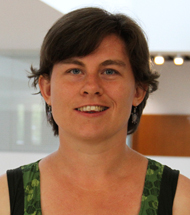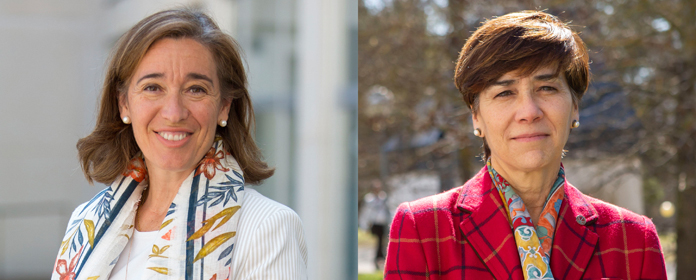Trust, core topic and challenge for university professors teaching their subjects in English
Hanne Roothooft, professor of Didactics of language and Literature, spoke at a congress on the use of languages in different professional fields, held at the Institute for Culture and Society

PHOTO: Natalia Rouzaut
Confidence is an aspect core topic when teaching a subject in English and one of the weak points that Spanish university professors who offer their subject in the English-speaking language tend to have. This was explained by Hanne Roothooft, professor of Didactics of language and Literature at the Public University of Navarra, at the framework of the XVIII congress of the association European Languages for Specific Purposes (AELFE), held at the University of Navarra. Institute for Culture and Society University of Navarra.
At meeting he has presented a research on the viewpoint of university professors who teach their classes in English. She conducted it together with Ruth Breeze, co-principal investigator of the project 'Public discourse' of the ICS, with funding from Cambridge English.
From agreement with their findings, a teacher's first reaction when told to deliver their subject in English is often fear. "Study participants confessed their fear of not being able to express themselves correctly in English; they were worried about not finding the right words, their pronunciation, and their fluency," Roothooft said. In fact, when asked what subject support they would like to have, most of the requests were related to improving their level and confidence with English.
The researcher believes that "the most important thing for teaching class in English is that teachers feel comfortable and self-confident". In her opinion, it may even be more important than the level of proficiency of language. As they saw in their research, the attitude of many teachers towards subject changed as the classes went on, they improved internship and saw that they could do it, that the students understood them.
"In Spain, there is an idea that other languages are not well spoken," the expert commented. She reminds us that we don't normally speak with native speakers: in a classroom with international students, not all of them are Anglo-Saxon. Besides, "we all have accents," she jokes.
Keys to teaching class in EnglishRoothooft also regrets that, in many cases, this lack of confidence may be due to a lack of adequate training from their academic centers: "They don't feel prepared, they don't give them training or explain very well what they have to do". While some universities do offer general English classes, he argues that they are not enough. "They need financial aid on how to give the subject in English, how to interact with students," he has insisted.
In this way, the researcher emphasizes that the methodology when giving the class is essential. Although some researchers believe that translating the content is enough, Roothooft believes that the class should be made more interactive. "Sometimes it is better to say less and make it clear, to be interactive, to rely on other materials and even on the participation of the students," she said.
On the one hand, this can help the confidence of the teacher, who does not have to deliver a masterful class in English. On the other, it encourages students to understand and maintain attention at class. "Even on your own language, following someone talking for a long time is tricky," he said.
A bilingual futureAnother challenge that teachers pointed out when offering their subject in English was the low level of some students, which sometimes prevented them from following the class correctly.
According to the expert, teachers must adapt and discussion has even been created in the academic sector as to whether teachers should repeat the ideas core topic in Spanish so that everyone understands them or whether they should be faithful to the program and speak exclusively in English. On this issue, the researcher is in favor of asking students to repeat words or ideas core topic and translate them so that the teacher can see that they have understood subject.
Despite the importance given to English nowadays, Roothooft is surprised by the scarce bilingual offer in Spanish university careers. "There are still many degree programs where nothing is taught in English to students who realize the need for it when they enter the working world," he says.





